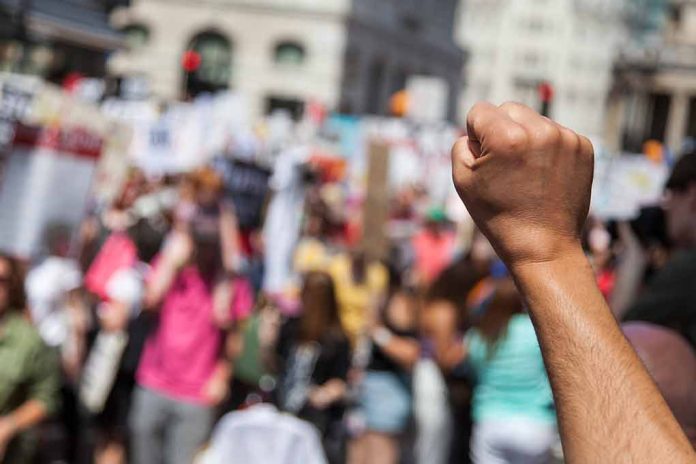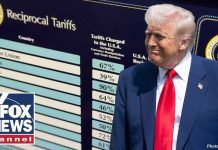
Colombian presidential candidate Miguel Uribe Turbay is fighting for his life after being shot twice in the head and once in the knee during a campaign rally, as U.S. Secretary of State Marco Rubio condemns the attack as “a direct result of violent leftist rhetoric” from Colombia’s government.
Key Takeaways
- Conservative Colombian presidential candidate Miguel Uribe Turbay was critically injured in an assassination attempt at a campaign rally in Bogotá, with shots to his head and knee.
- U.S. Secretary of State Marco Rubio directly blamed “violent leftist rhetoric” from the Colombian government for creating a climate that enabled the attack.
- A 15-year-old suspect armed with a 9mm Glock-type firearm was apprehended shortly after the shooting.
- The attack marks the first high-profile political assassination attempt in Colombia in decades, raising fears of a return to the country’s violent political past.
- Uribe’s wife reported he “overcame the first surgical procedure” but remains in intensive care fighting for his life.
Assassination Attempt Rocks Colombian Politics
The 39-year-old conservative senator and presidential candidate Miguel Uribe Turbay was shot during a campaign event in the Fontibón neighborhood of Bogotá on Saturday. According to reports, Uribe was hit once in the knee and twice in the head while speaking to supporters. The brutal attack was captured on video and has been circulating on social media, showing the horrific moment when gunfire erupted at what should have been a routine campaign stop. Uribe was immediately airlifted to the Fundación Santa Fe clinic in critical condition as supporters and security personnel scrambled for safety.
Colombian authorities quickly apprehended a 15-year-old suspect who was found with a “9mm Glock-type firearm.” The Ministry of Defense has offered a reward of nearly $750,000 for information about the assassination attempt, underscoring the gravity with which the government views this attack on democratic processes. Colombia’s presidential election is scheduled for next May, and Uribe, who announced his candidacy in October, has been a vocal critic of leftist President Gustavo Petro’s administration. The shooting has intensified the already deep political polarization in the country.
🇨🇴 SUSPECT ARRESTED AFTER COLOMBIAN CANDIDATE SHOT AT RALLY
A conservative senator running for president in Colombia just got shot in the head during a campaign event in a public park.
The shooter’s been caught, but police think more people might’ve helped.
Meanwhile, the… https://t.co/PIzF5Z41bJ pic.twitter.com/vcqG7pF7Zy
— Mario Nawfal (@MarioNawfal) June 8, 2025
Rubio Blames Leftist Rhetoric for Violence
U.S. Secretary of State Marco Rubio issued a powerful statement condemning the attack and directly attributing it to what he described as dangerous rhetoric from Colombia’s leftist government. “The United States condemns in the strongest possible terms the attempted assassination of Senator Miguel Uribe. This is a direct threat to democracy and the result of the violent leftist rhetoric coming from the highest levels of the Colombian government,” Rubio said, calling on President Petro to “dial back the inflammatory rhetoric and protect Colombian officials.”
“Having seen firsthand Colombia’s progress over the past few decades to consolidate security and democracy, it can’t afford to go back to dark days of political violence. President Petro needs to dial back the inflammatory rhetoric and protect Colombian officials,” said Marco Rubio, U.S. Secretary of State.
Other U.S. officials joined in condemning the attack. Ohio Senator Bernie Moreno called it “a vile attack on democracy” and demanded that “anyone responsible, directly or indirectly, must face swift punishment.” The strong response from American officials highlights growing concerns about political violence and extremist rhetoric in Latin America, particularly from leftist governments that have shown increasing hostility toward conservative opposition figures. President Trump’s administration has consistently warned about the dangers of radical leftist influence in the region.
A Return to Colombia’s Violent Past?
The attack on Uribe has drawn comparisons to Colombia’s violent political past, particularly the 1989 assassination of presidential candidate Luis Carlos Galán. Analysts warn this could signal a dangerous regression in Colombia’s political climate. “Evidently this [attack] shows an erosion of Colombia’s security and political climate in the short term,” said Sergio Guzmán, Director of Colombia Risk Analysis. The incident is particularly chilling given Uribe’s family history – his mother was killed by Pablo Escobar’s Medellín cartel, and his grandfather was a former president.
“At this moment, Miguel is fighting for his life. We ask God to guide the hands of the doctors treating him,” said Maria Claudia Tarazona, Uribe’s wife.
Uribe’s wife provided a cautiously optimistic update, stating he “overcame the first surgical procedure” but remains in intensive care. “He fought the first battle and fought it well. He is fighting for his life,” she said, requesting prayers for her husband’s recovery. Despite the gravity of his injuries, the fact that he survived the initial surgery has given supporters hope. Meanwhile, protestors have taken to the streets across Colombia, demanding justice and better protection for political candidates. The attack has united many Colombians across the political spectrum in condemning political violence, even as blame for creating the conditions for such violence continues to be debated.
Broader Implications for Democracy
This assassination attempt raises alarming questions about the safety of conservative politicians in countries with leftist governments. The targeting of Uribe, a prominent right-wing figure and critic of President Petro’s administration, follows a pattern seen across Latin America where conservative opposition leaders face increasing threats and intimidation. In Colombia specifically, the attack threatens to derail the democratic process ahead of next year’s presidential election and could lead to further political instability as tensions between the left and right intensify.
“Whoever ordered this assassination… very clearly had the intention of throwing gas onto a fire, trying to be incendiary in an electoral context that is already deeply polarized,” said Elizabeth Dickinson, senior analyst at the International Crisis Group.
President Petro, who cancelled a planned trip to France following the attack, has called for an investigation and condemned the violence. However, critics point out that his own rhetoric against opposition figures has been consistently inflammatory. The incident serves as a stark reminder of how dangerous political rhetoric can translate into real-world violence, particularly in regions with histories of political instability. It also underscores the importance of holding leftist leaders accountable for their words and actions that may contribute to a climate of hostility and violence toward political opponents.



